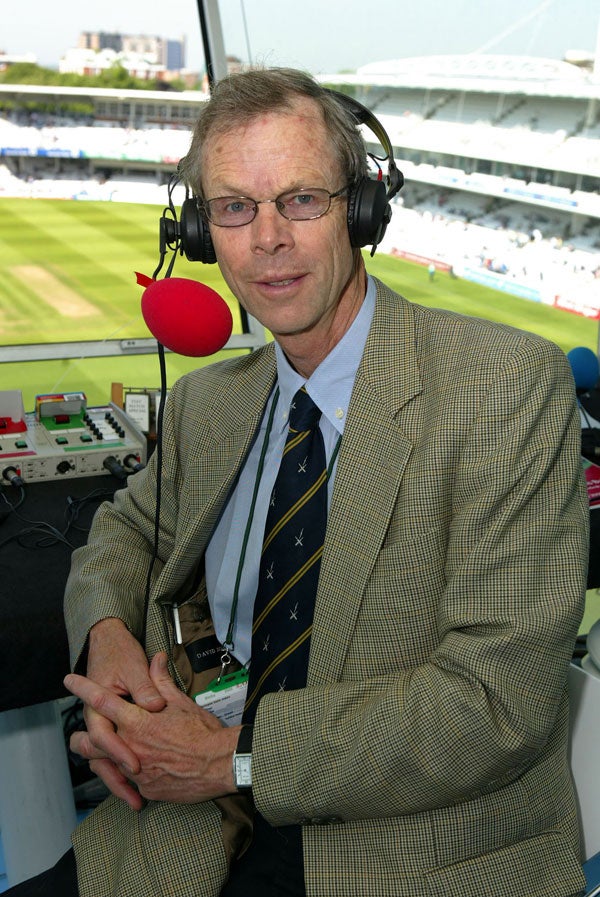Passed/Failed: An education in the life of Christopher Martin-Jenkins, cricket commentator
'I became captain of cricket and head boy'

Your support helps us to tell the story
From reproductive rights to climate change to Big Tech, The Independent is on the ground when the story is developing. Whether it's investigating the financials of Elon Musk's pro-Trump PAC or producing our latest documentary, 'The A Word', which shines a light on the American women fighting for reproductive rights, we know how important it is to parse out the facts from the messaging.
At such a critical moment in US history, we need reporters on the ground. Your donation allows us to keep sending journalists to speak to both sides of the story.
The Independent is trusted by Americans across the entire political spectrum. And unlike many other quality news outlets, we choose not to lock Americans out of our reporting and analysis with paywalls. We believe quality journalism should be available to everyone, paid for by those who can afford it.
Your support makes all the difference.Christopher Martin-Jenkins, 65, is the Radio 4 and Radio 5 live sports extra Test Match Special commentator and the former editor of The Cricketer. "CMJ" is the author of The Complete Who's Who of Test Cricketers and, just out, the paperback of The Top 100 Cricketers of All Time.
An immediate consolation for going away at seven and a half to St Bede's, a prep school in Eastbourne, was the cricket; it was the summer term and, for me, the seeds were already sown. I became captain of the cricket team and head boy, a reasonably big fish in a small pool. I was very bad at maths. Miss Mclean would ask "Has the penny dropped?" when she explained to us how to do a sum, and everybody would say: "Yes". I was too frightened to say I didn't understand.
I then got into Marlborough via the Common Entrance. I was especially well taught in my favourite subjects, history and English. There was a brilliant maths teacher, Douglas Quadling. He was a pioneer and wrote books about mathematics, but it was way above my head.
One example of poor teaching was a French teacher who used to refer to Louis XIV as "Lewis". Actually, I got French O-level, so he couldn't have been that bad. At A-level, I did history and English and got very ordinary Bs; that would certainly not have got people into Oxbridge these days, but those were the days when they took other "qualities" into consideration.
I was captain of cricket. We narrowly lost a terrific two-day match against Rugby at Lord's, and despite making 99 it was partly my fault for getting too excited. I always had ambitions to broadcast and write about cricket. I used to practise commentating into a tape recorder in front of the television or at a county match – as far away from anyone as I could get. That was the advice given to me by [commentator] Brian Johnston after I had written to him and he had asked me up to Broadcasting House for lunch.
I did a bit of fooling around on stage, trying to make people laugh. Also, I was in an obscure play called The Moon in the Yellow River by Denis Johnston; I took the lead part, but didn't really understand it. I also had the lead part in John Osborne's Luther.
I was offered a place to read history at Fitzwilliam College, Cambridge, conditional on passing elementary maths O-level, which I had failed. David Starkey was an exact contemporary at Fitzwilliam. My teachers at school were amazed when I got a 2:1 – I was a late developer. I was a member of the Cambridge Footlights club, qualifying by doing political impersonations. I have lost that skill now.
I got a "half-blue" for playing rugby fives for the university for two years. I skippered Fitzwilliam to their first win in cricket "Cuppers" [the inter-college cup contest]. It was a consolation. University cricket was a disappointment: I was only on the verges. I played for Cambridge against a Dutch touring side and in a three-day match for the Quidnuncs, which comprised old blues and a few undergraduates who were on trial. It started on a glorious Saturday, Sunday was a rest day, and it was abandoned due to fog on Monday after the Quidnuncs had collapsed in difficult batting conditions. I was bowled for nought by my predecessor as cricket captain at school.
After Cambridge, I went to The Cricketer magazine as an assistant editor and after three years to the sports news department of the BBC. Frankly, I have been very lucky.
Join our commenting forum
Join thought-provoking conversations, follow other Independent readers and see their replies
Comments